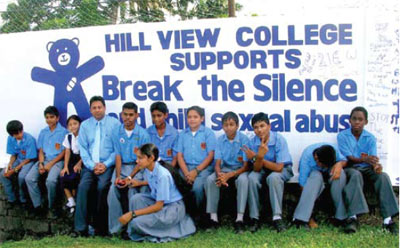 |
 |
 |
|
January 2014
|
In an increasingly sexualised world, how are issues of power, pleasure and social justice to be reconciled? This was the final question posed by Deputy Principal, Professor Rhoda Reddock, one of the Caribbean’s foremost researchers on issues of gender and development, as she addressed the national launch of the Break the Silence campaign on January 15 at the Hyatt Regency. Break the Silence is a combination of research and actions stemming from a multi-sectoral approach to addressing child sexual abuse (CSA) and childhood incest in Trinidad and Tobago. Part of a wider research programme on gender, sexuality and implications for HIV, the project was initially carried out over the period 2008-2011 by the Institute for Gender and Development Studies (IGDS) at The UWI, St Augustine Campus. The research team is led by Prof Reddock, and comprises Dr Sandra Reid, lead researcher, Lecturer in Psychiatry, at the Faculty of Medical Sciences, Tisha Nickenig, project coordinator, and Kathryn Chan, media campaign consultant. At the launch, Professor Reddock indicated that through the work of UNICEF and the UN system, the campaign has now been expanded at a sub-regional level; and that locally it will receive the additional support of the Ministry of Gender, Youth and Child Development. The IGDS will work with these bodies to host a programme of capacity building for civil society organisations, the media, police and judicial officers.
The BTS campaign, symbolized by the blue teddy bear, is meant to reduce stigma and raise awareness; to encourage action from policy makers; and to establish a global symbol similar to the HIV/AIDS and breast cancer ribbons. So far, BTS has yielded several reports and reviews of the literature and legislation, posters and postcards, a documentary film and educational booklet, 13 Webisodes, a four-minute video, a radio soap opera with the Toco community, and other academic papers and posters. Five policy briefs on gender, education, HIV and CSA, service delivery and legislation have been done, as well as Draft Protocols for Child Sexual Abuse/Incest Service Delivery developed by service providers. Among others, Professor Reddock made the following recommendations: the incorporation of gender and sexuality education in teacher and social work education programmes; parenting programmes and HFLE programmes must include issues of gender and sexuality; work with men must focus on the need to take responsibility for their sexual actions and decision-making; strengthened social intervention programmes and support systems at all levels of society; psycho-social support for survivors. She also said that homophobia must be addressed as this contributes to extremes of masculine behaviours. |


 Citing startling figures to support findings that despite the prevalence, CSA and incest are ‘accepted’ and unreported, Prof Reddock noted that as a form of sexual activity in a context of unequal power relations, there could be implications for HIV, and that it “was necessary to find out how it was understood, rationalized and the meanings attached to it; and to have clear protocols and policies to address this issue.”
Citing startling figures to support findings that despite the prevalence, CSA and incest are ‘accepted’ and unreported, Prof Reddock noted that as a form of sexual activity in a context of unequal power relations, there could be implications for HIV, and that it “was necessary to find out how it was understood, rationalized and the meanings attached to it; and to have clear protocols and policies to address this issue.”